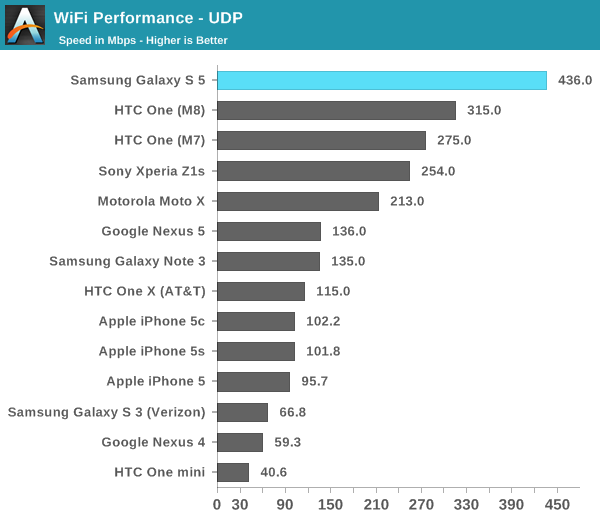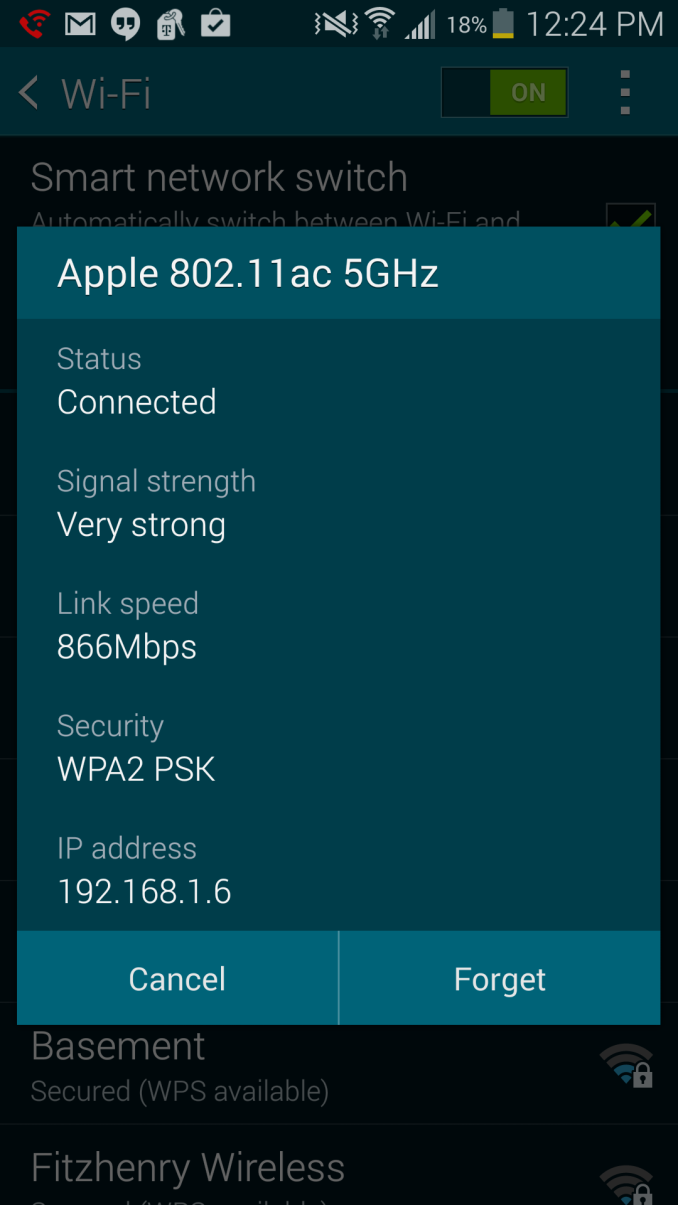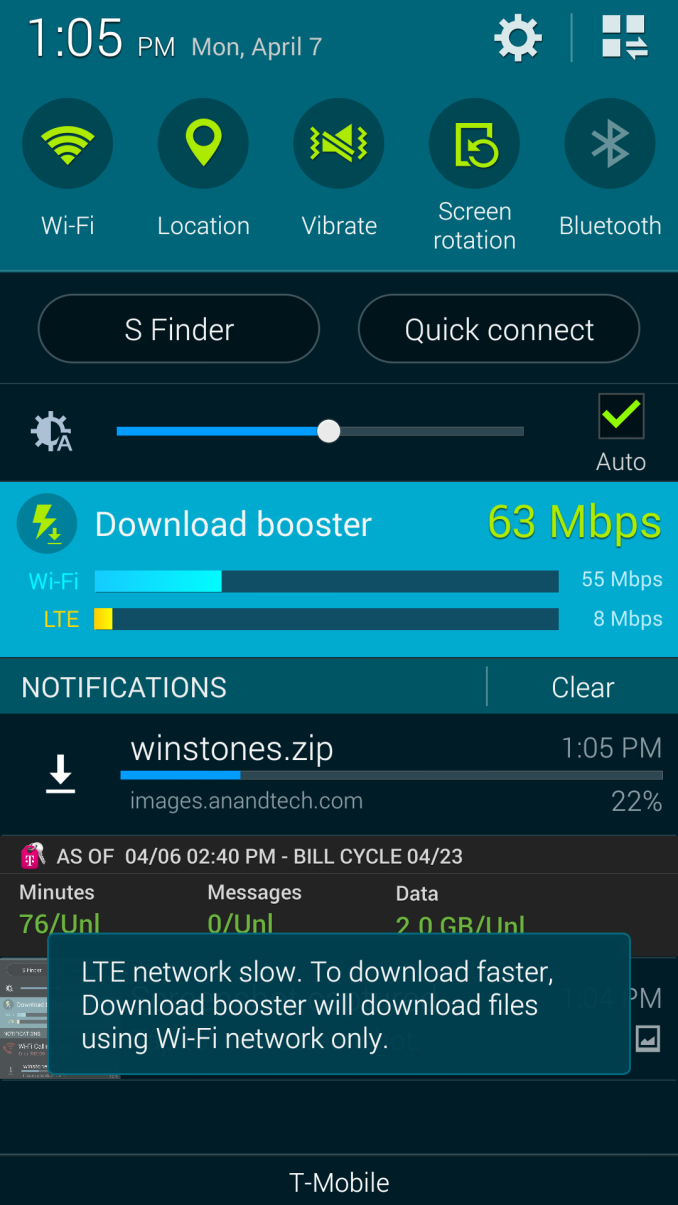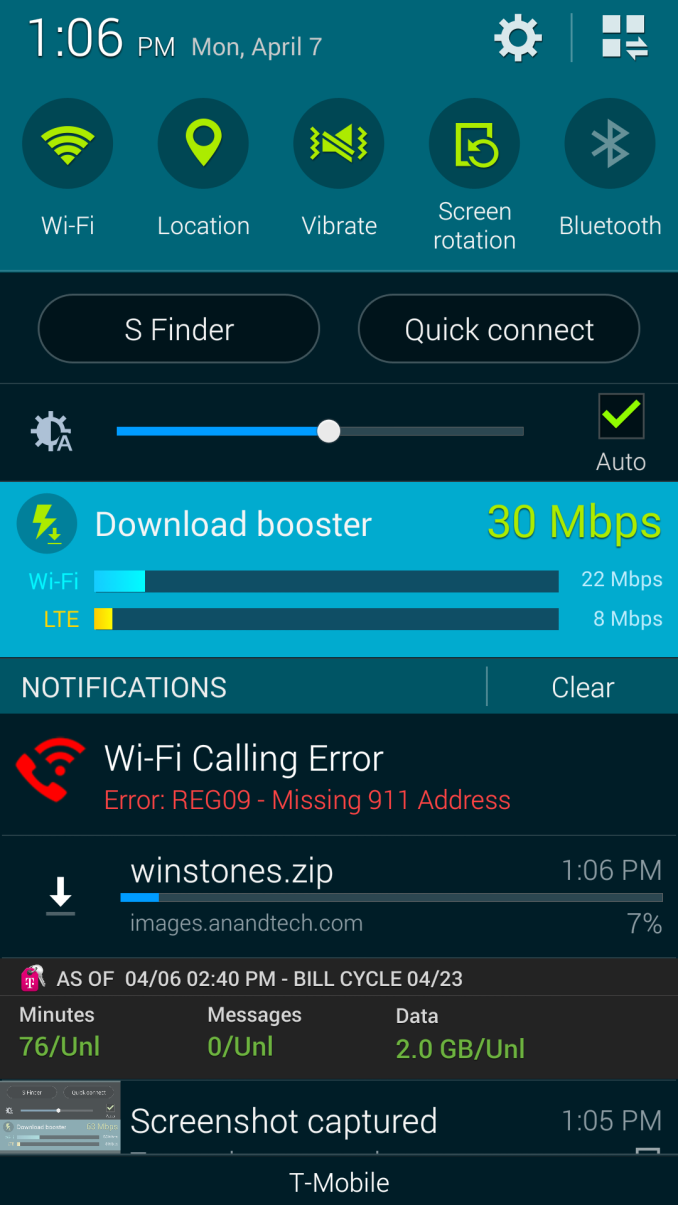Samsung Galaxy S 5 Review
by Anand Lal Shimpi & Joshua Ho on April 8, 2014 12:00 AM EST- Posted in
- Smartphones
- Samsung
- Mobile
- Galaxy S 5
WiFi, Cellular & Download Booster
At MWC this year Broadcom announced its BCM4354 802.11ac 2x2 MIMO WiFi combo chip for smartphones/tablets, which found its way into the GS5. The result is a smartphone capable of negotiating with an 802.11ac AP at 867Mbps, and transferring data at up to 436Mbps.
Although peak performance is nice, there are also power benefits to being able to transfer data quickly over WiFi (race to sleep applies to network interfaces as well).

The Snapdragon 801 features Qualcomm's integrated category 4 LTE 9x25 modem core. As I mentioned in our power analysis, Samsung also chose to include Qualcomm's QFE1100 envelope tracker (just like in the Galaxy Note 3). The GS5 is also the first flagship Samsung device to include support for 2 carrier aggregation on supported LTE networks. Samsung doesn't appear to be using Qualcomm's antenna tuner or any other RF360 components in the Galaxy S 5.
Seamless transition between network interfaces is one component of Qualcomm's vision of the future of connected devices. The problem is presently more of a software one than a hardware challenge. Samsung is beginning to explore software abstraction of underlying network interfaces with the GS5's software stack. There's now an option to prevent transitioning to WiFi networks that don't offer an improved network experience compared to your broadband connection. I haven't had a ton of time to test this feature out yet but it's something I plan on messing with more over the coming weeks.
The other big feature is what Samsung is calling Download booster. If enabled and under the right conditions, download booster allows you to combine WiFi and cellular network interfaces to accelerate large file downloads. All you have to do is enable download booster and you'll get a notification if it's active and working:
Download booster uses HTTP range requests to divide up files between the two network links. The feature can migrate data sessions from one link to another (WiFi to LTE, LTE to WiFi). Supported apps include the Play Store, YouTube, Facebook photo/video downloads, Samsung apps and standard HTTP web browsing (both Samsung's own browser and third party browsers). FTP and UDP aren't supported, nor is HTTPS.
There are other limitations as well. File downloads smaller than 30MB won't trigger download booster. Similarly, if one of the interfaces is substantially faster than the other download booster won't activate either. My home internet connection can regularly pull files down at 50 - 60Mbps, compared to < 10Mbps for T-Mobile LTE. When I was getting ~7Mbps over LTE and 50Mbps over WiFi, download booster automatically turned itself off. If I throttled my home network to 22Mbps however, download booster did its thing and gave me a healthy combined download speed of 30Mbps.
Download booster is a neat feature, although of limited use for those of us without truly unlimited high speed data plans. That being said, if you need to speed up a download in a pinch it's a great way to do that. I'm often at a press event wanting to download a benchmark onto a device as quickly as possible, usually without great WiFi or cellular reception - I can see download booster being very useful there at least.













296 Comments
View All Comments
kmmatney - Tuesday, April 8, 2014 - link
My LG Optimus Pro G has a MicroSD slot, and a larger screen, and was a lot cheaper than the G2. That said, I won't buy an LG phone again - third party support is too weak, and there are some really annoying bugs in the software that haven't been fixed. I would like to go back to Apple, but need a larger screen, and enough space for 24 GB of music.Cheesew1z69 - Sunday, April 13, 2014 - link
Spreading your BS here too...how...cute.pppp6071 - Tuesday, April 8, 2014 - link
lol very funny. Ignoring all best aspects like battery life gorgeous screen and knock code and superb camera. just cause its not having SD card it sucks. I am doing just fine with my Nexus 5 32 GB phone.Alexey291 - Tuesday, April 8, 2014 - link
Very funny indeed. I have more music on my sd (thanks g-music subscription) than you have on your device.Lets not even look at apps and other media that I may have on there. But do go on.
Alexey291 - Tuesday, April 8, 2014 - link
that is to say I have more gigs of music on my sdSorry :)
Mondozai - Tuesday, April 8, 2014 - link
Streaming is possible. Welcome to 2014.SD cards are a requirement on tablets, not phones. If you need more space on your phone, you are not using it right.
Alexey291 - Tuesday, April 8, 2014 - link
Yes because endless free mobile data is a global thing. I travel a lot I don't like to pay roaming charges for streaming all around europe. I suggest you try it one day and see how that works for you.And I approve of the "you're not holding/using it right" comment at the end.
SD cards are a requirement on a device that I require to have an SD card. Simple as that. Besides why the hell does a tablet need an sd card more than a phone? Can't you by your own (silly) logic simply stream Blueray movies or something? Or is that going to be a 2015 thing?
twebber - Tuesday, April 8, 2014 - link
Yeah if you loose internet or signal while I'm watching a wide selection of movies an listening to an extended library you can enjoy your sad replay listVeruca5alt - Sunday, April 27, 2014 - link
Who cares??You use over 20GB of music everyday?
Pointless to carry around that much content.
Chaser - Tuesday, April 8, 2014 - link
Couldn't agree more. The G2 is the winner this round.